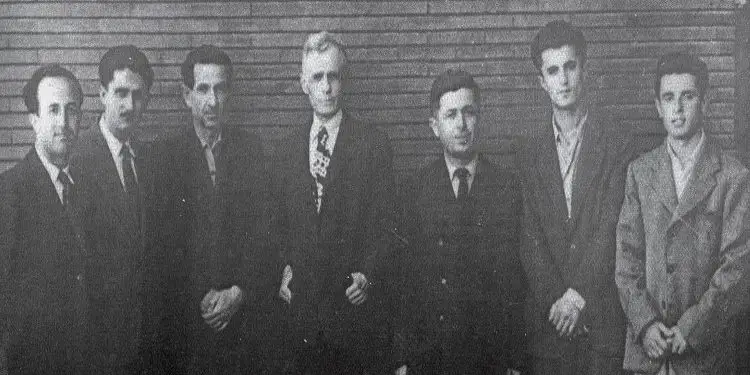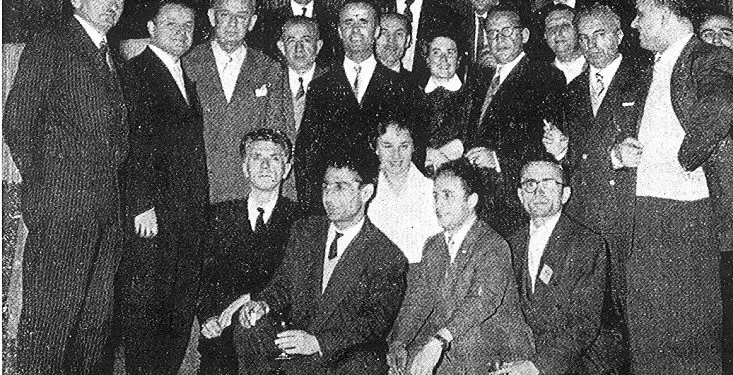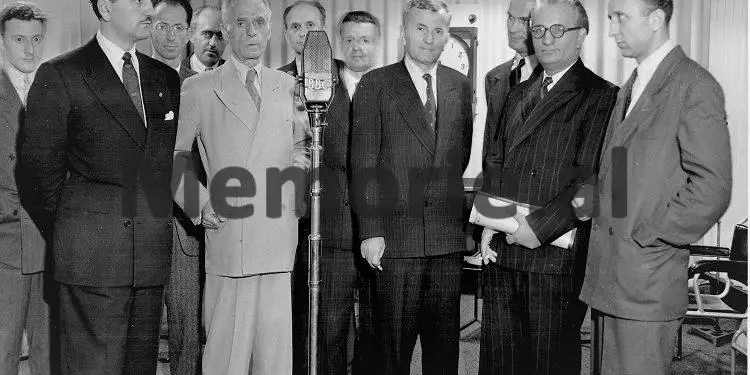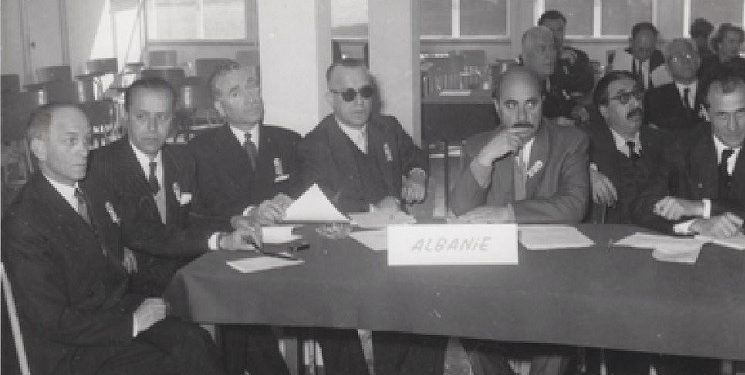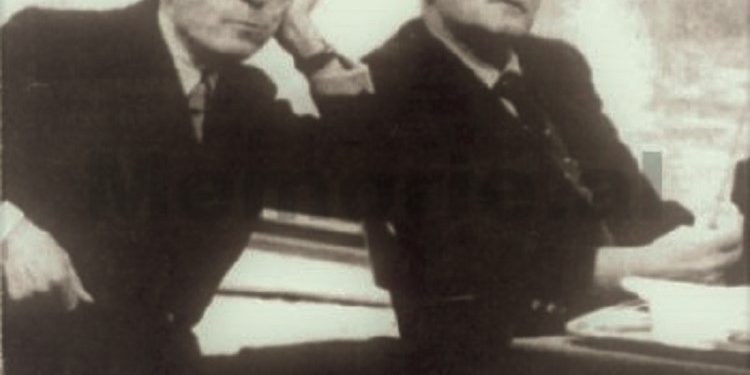By Dalip GRECA
Part Two
Memorie.al / Enver Shaskaj lives in New York. He is a strong man and still does not part with the activities of the Albanian community. He is an active participant in the activities of the Legality Party and those of the Pan-Albanian Federation “Vatra”. The old nationalist does not forget the painful moment of separation from his homeland. “I wept, I cried,” He says, “when I left my motherland. I remember standing there looking towards my homeland until the mountain peaks disappeared from my sight. I have everything in front of me, as if it happened today,” he says, and begins to browse through his memory: I fled Albania in November 1944. On November 19, I left Shkodra. On November 21, we arrived in Monopoli, Bari, Italy. The journey was difficult, full of surprises. We set off from Tivar. Initially, we were gathered in Shkodra, when the communists’ power had spread throughout Albania. I was the fifth in my family who wanted to conquer the sea. I had an uncle, Sadik Shaska, another uncle, Hakimi, my brother Tajari, his uncle’s son, Hekurani. There was also a cousin who remained in Albania, named Filo Shaskaj. I was 23 at the time years old”.
Continued from the previous issue
Enver Shaska’s testimony
“They asked for Nuri Plaka by radio, supposedly as if Hamit Matjani wanted him to be there. This one, the seventh one, sets off. When they land, as a slogan, the Sigurimi gives the slogan of the mission and, just as they captured Hamit, they wanted to capture Nuri too.
– No, no, – says Nuri. Not that slogan, but the slogan that I left with Hamit in Athens, when we parted for the last time.
There the gunshots rang out and many were killed. There Nuri Plaka was also killed. As time went on, things got worse. The war cooled down. We were victims of Philby’s game with others”.
I ask Enver Shaska:
– These successive defeats, the traps that your friends fell into as soon as they set foot in Albania, didn’t they raise suspicions in you?
– “First of all, we weren’t in control of the game. Second, it was the ideal to overthrow communism that kept us there. But the bad thing was that those who were in control of us said that even if we were dead; we would throw you there, so that they could raise the people against the government. In fact, there were some things that we saw that weren’t right.”
– What, can you name some of those that you’re calling “things that weren’t right?”
– “Fights often broke out. They had other ways and confused us with each other. I don’t know why I still think that they wanted to, without keeping us divided. If they wanted to, we wouldn’t even have divisions, but I say that they wanted to keep us that way.”
From Canada to the USA, from Paris to Istanbul
Successive failures made it impossible to continue the mission. Shaska remembers that in 1955 he left Germany. The life of an immigrant goes through other vicissitudes. He settled in Canada, where he spent not a few, but five years, as much as he had spent in Germany, and as much in Italy. The loneliness was tiring him, so he sought a new shelter. He asked for help from his brother in Detroit, Tajar. He did not hesitate to do so, he prepared the documents for him and Enver Shaska left Canada. “We had our friend Muhedin Haxhi, the son of Osman Haxhiu, who lived in New York. Muhedin was a very kind man in the full sense of the word. He said to my brother:
– Send Enver here, because I am all alone and have no one. Muhedin’s sister was married to my younger uncle, Refati, and so we had family ties with her.”
– Yes, Refati, did he stay in Albania?
– “Refati has a long history, but it’s coming to an end. He was educated in Italy and loved Italian culture, not fascism. When he went to Albania during fascism and when they asked him what fascism was for him, he replied: Good Italians aren’t with fascism. After finishing work, he went back to Italy, but not long after, he was arrested. He learned the reason later: Those friends, who provoked him and who pretended to be anti-fascists, had spied on him for fascism. They tried him in Albania. He served 7 months in prison, the poor guy.”
– Let’s get back to your story, when did you leave Detroit?
– “My brother told me to go to Muhedini in New York and I came. When I came here, I still felt lonely. I was still alone; I had not started a family. Muhedini Effendi was very close to me, telling me to get married. I objected:
– Oh Muhedini Effendi, the mouse has no place for itself, you say; take the pumpkin for the back. Where should I get married?
– Family is the key, – he insisted and without waiting for my decision, he started the preparations.
He was corresponding with Rexhep Radomir, an officer of Zog who was in Istanbul, and he told him that I was sending a son of my friend there, and if you would be interested in finding him a good Albanian girl.
– I will help you, send me, – he said, – leave for Istanbul.
Muhedini had his brother in Paris. It was 1966. I went to Paris and met him. In Paris I also met with Abaz Kupi’s son, Petrit, and Galip Haxhiu, both of them, took me to dinner.
I said to them:
– Okay, I’m going to Istanbul, but I don’t know a word of Turkish.
They explained to me the route I would take to Istanbul. Petrit told me not to worry, but when I saw a pastry shop, I should go inside and speak Albanian. He started to make fun of me, – I thought. I went to Istanbul, I didn’t understand a word. Petrit’s words came to my mind and I stood in front of a pastry shop, I saw the owner from the window and the Albanian face appeared to me. I took a syltijash, got up and paid. I said to that shopkeeper:
– Are you Albanian? That bastard, he stood up”.
The adventure in Turkey lasted a long time and Shaska, through a subtle humor, tells how he wandered around Istanbul and how he rejected the first girl who was recommended to him, and then in the moments when his patience was exhausted and he was about to take the road back, he had appeared to him in a dream, where he had begged him: “Enver, don’t leave for 5 days” and raised his hands. “I got up a little angry and said to myself that I would take this word to my brother instead, and I would not leave. I would stay for 5 more days. You know, in those five days I found my wife. These are things that a person… why do they say luck, risk. We got married. We went to the American embassy”.
But the adventure did not end there. It took months for the wife to come to America, documents, letters and Shaska tells how the groom, without a bride, returned to New York. After some time, the bride would travel to America. The Shaska couple has two children, a daughter who is a police detective and a son who works in Las Vegas.
When I returned to Vlora, I told them: Look, I am that “criminal”…!
I turn the conversation back to the accusations made against Enver Shaska, declaring him an enemy and a criminal. He answers me once: “To be honest, I didn’t kill anyone. I’ll tell you a secret: We went to war in 1944, to fight the Germans, who had occupied our homes. Time and politics also put us in front of the communists. We had a cousin on our mother’s side that, may his soul rest in peace, when we left for the cheta, he told us:
“Amani Enver, amani Tajar, doesn’t kill anyone with your own hands”! We were very lucky, because if they kill you, you will kill yourself too. A son was killed, who was neither a brother, nor an uncle, nor a cousin. In the war, we fought as hard as we could, but we killed anyone, we went to the shah to kill anyone, or we disappeared anyone, I give you my word of honor, I swear, we didn’t do it. I told them in Albania too.
Kadri Hazbiu had made us two brother’s war criminals. What kind of war criminal was I, a 22-23 year old boy?! Where had I participated in any government, or in any command? I was so young, I was following my uncle and I had not committed any crime. When I went to Vlora, after democracy, in 1993, an aunt of mine had died. This was my first visit. There were many people there. A man who was a friend of mine and I had a friend of his, tells me that we were together at the Korça Lyceum, Vendigjar Hamzaraj, they called him. As soon as he saw me, he stood up and said to me:
– Enver, how is you and how are you doing?
– Good, – I said. I had forgotten that 50 years had passed.
He said: – Do you know me?
– No! – I replied.
– And me, why do I know you?
– You know that I came here with my people. Then I am one, you are many. He said to me:
– I am Vendigjari. He had also been with the communists, but then the communists put him in prison. So half me, half a bird. He said:
– He had completely turned white. And his hair had completely fallen out. There was a gasp.
– Yes, – I said. I have turned white, and you have nothing.
I found the most convenient opportunity and burst into them there:
– How is it possible to make me a war criminal, without doing anything? Here you are. Take me and walk me, to all four corners of Vlora. A man came out to tell me that you, Enver Shaska, did this to me, not you foreigners, but also mine, to spit on me, – I said to them.
They were silent. They were just listening to me.
– Yes, this is the greatest meanness, to accuse a man of something he never did; – Enver Shaska bursts out inwardly and continues the story:
When I went to Vlora, from Skela to my brother’s, up, I was with some friends and acquaintances who wanted to accompany me.
– No, no, – I told them. I don’t want anyone to accompany me. I haven’t killed anyone and I have no revenge on anyone to get in my way.
It was night, three hours after midnight. I have some uncles of mine, in Gumenica.
A boy comes. The communists had killed his father. He asks me to go there to the village because he had a request from his older brother. My brother and his nephew signal to me: Don’t, because it’s dangerous there.
– Yes, I’ll come tomorrow, – I told him.
We went as far as Kota and passed through Gumenica. They welcomed me as if I were no better. He didn’t find anything for me. However, a villager from Igoumenitsa in Tirana, when I told him that I was in Gumenica, was surprised and said to me:
– How did you come to Gumenica!?
– Why, did you!? – I told him. I have not committed crimes and I have not killed anyone. I was not afraid of anyone who would stand in my way.
– What a burden Enver Shaska has in his heart.
– When we fled Albania, at that time we were in Tirana. Our family had fled from the village to Vlora and then to Tirana. In Tirana I remember some memories of my mother and father. When my mother wanted to kiss us, my older brother put his hand in front of her face.
– Take your mind off the adults, mind these little ones. She said to him:
– Don’t, Tajar, because I am a mother.
I let him kiss me. My father, another uncle, Hakimi, said to him as he was leaving:
– Hakim! You went with your heads held high, don’t go with your hands tied and don’t surrender.
The uncle said to him: – What about these? – For us two brothers.
-If they are my sons, let them be killed, if their mother caught them, with some kind of weapon, let them surrender.
This moment was in August 1944 and we never saw each other again. We were at home for one night. We would have fled, wherever our heads fell, but not surrender. From August to November, we didn’t see our mother and father. One night we saw them. My father’s last words were these: “Die and don’t surrender”! We went with our heads held high and I don’t remember either my mother or my father. My father died 2-3 years later. They died one after the other, over a period of months. When they died, through the Red Cross, we received a letter from one of our sons-in-law, telling us that our father had died. This is a pledge, to die and not see your loved ones.
– When was the last time you went to Albania?, – I ask Shaska.
-After ’93, I was there twice, in 1995 and 1997. My brother died here and we went to bury him there. His wife died on December 17, 1996. He himself died on January 26, 1997, for a month. When his wife died, we went there and her son came from Albania, picked her up and took his mother to Albania. I took her to my house, from Detroit. He was suffering from a heart attack and the doctor said that if you take him by plane, he will die. I told my son that when I see him getting worse, you come. My son has arrived. After sitting with him for a while, he got up.
– Tajar where are you?
– Here, you see, – he said, – he’s calling me. He was talking about his wife. We saw each other. But he always said to bury her in Kocul, in the village. Well, your hometown never leaves you.
Eternal legalist
The Shaskajs were connected to the King, not only because Sadiku was a deputy, but also when they came later, they remained loyal to the King. Enver says that the referendum was won, but the communists manipulated it. Even the neighbors didn’t want him to win, because they were tired of ethnic Albania. The Greeks had no interest. Even in Dropull, Delvina and those places, the Greeks spent a lot of money to prevent Leka from setting foot there. Memorie.al




